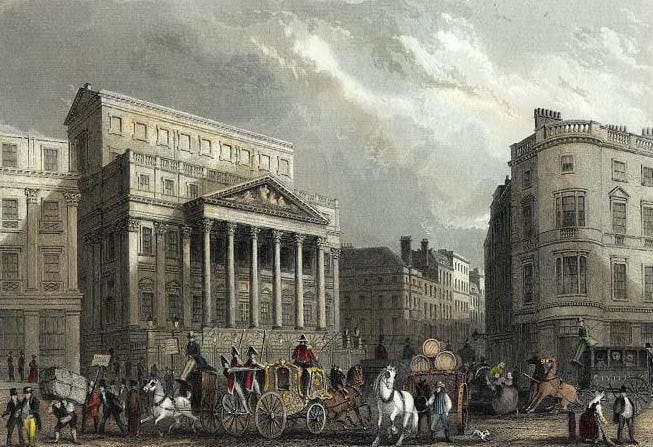The dead witness
Edinburgh private detective James McKelvie gave evidence at a fraud case at the Old Bailey in 1873 - despite being dead...
James McKelvie was a Scottish policeman turned private detective in the 19th century, who had worked in France before setting up his own business back in Edinburgh. His home was at 120 Nicholson Street, part of a row of houses minutes away from Edinburgh University. In 1873, he was involved in a case of deception and forgery against the Bank of England that saw him chase down one of the suspects and capture him. Sadly, by the time the case reached the Old Bailey, he was no longer alive to see the suspect found guilty.
Edinburgh in the 1870s (public domain)
The case involved four American men - 27-year-old Austin Biron Bidwell; his brother George Bidwell, 34; Edwin Noyes Hills, 29; and New York native George MacDonnell, 28. The men were accused of forging a £1000 bill, with intent to defraud the Bank of England, and uttering that bill.
The case was initially brought before the Lord Mayor at Mansion House, and James McKelvie travelled down from Edinburgh on 4 April 1873 to give his evidence. When his train got in, he journeyed straight from the station to Mansion House, and began his evidence just half an hour after his arrival into the city. He then returned to Edinburgh, but on 27 June, he was back at the Mansion House to allow the suspects to cross-examine him, and his evidence to be read over. The case was then sent to be tried at the Old Bailey, but McKelvie never got to appear there in person. Three weeks after his second Mansion House appearance, on 15 July 1873, the private detective suddenly died of typhus fever. He was just 36 years old.
Mansion House (public domain)
If he had not prematurely died, McKelvie would have needed to return to London when the Old Bailey trial started, in order to restate his evidence. As it was, his evidence was read out on his behalf. George Oke, chief clerk at the Mansion House, first detailed James McKelvie's appearances there in April and June. Then, Scottish police detective David Ferguson, who had travelled down from Edinburgh to give evidence, appeared to say that he had known McKelvie, that he was definitely dead, and that he recognised his signature on his deposition. McKelvie's deposition was then read out, giving his views on what had happened from beyond the grave.
"I am a private detective officer, residing at 120 Nicholson Street, in the City of Edinburgh. I have within half an hour arrived here from Scotland. I received certain information from Gibson, Craig & Co of Edinburgh, writers to the signet, and in consequence of that I watched the house, 22 Cumberland Street, Edinburgh, on Wednesday last, 2nd April instant, from about 10.25 in the morning. It is a private house. The prisoner came out of the house to the door, looked round, and went back again, and remained in about 20 minutes, and then he came out, and from his appearance, I suspected he was George Bidwell."
McKelvie had followed Bidwell as he posted a letter in a pillar box, visited a stationer's shop, and then a baker's. As he stood at the door of the latter, he looked round, came out and went round the corner. Suddenly, he set off into a fast run, as though he knew McKelvie was there and wanted to run away from him. McKelvie ran after him as he ran into a blacksmith's shop - he then turned round and ran back past the detective.
McKelvie followed him again, with Bidwell alternately running and walking. His route down Drummond Place and Scotland Street involved jumping over a series of stone walls and running through a private house. Suddenly, as he got to Duncan Street in Stockbridge, he ran out of energy and stopped. McKelvie was still right by him. It was 2pm. Bidwell thrust a stick at McKelvie, who responded by pointing a baton at him "as if it were a pistol." McKelvie thought that Bidwell had made a Masonic sign at him, and so addressed him as a Masonic Brother:
"Stand and be a gentleman, and give me your hand; be a brother and not a coward. You are George Bidwell; you are wanted for the forgery on the Bank of England."
McKelvie called for help, and managed to get Bidwell into a cab with him. The two men were driven to Gibson, Craig & Co's office. There, Bidwell spoke in broken English, asked to be called James, and said he got fits of 'running off' because of 'giddiness in the head'. At 4pm, the police arrived, and James McKelvie handed Bidwell over to them.
McKelvie's posthumous participation at the subsequent Old Bailey trial only related to the involvement of one of the men, George Bidwell, who had fled to Birmingham before travelling onto Scotland, but it helped put all four men behind bars. They were all convicted to life in prison, and to pay a quarter of the prosecution costs each. The men served nearly 20 years in various prison in southern England, being released in February 1892.





